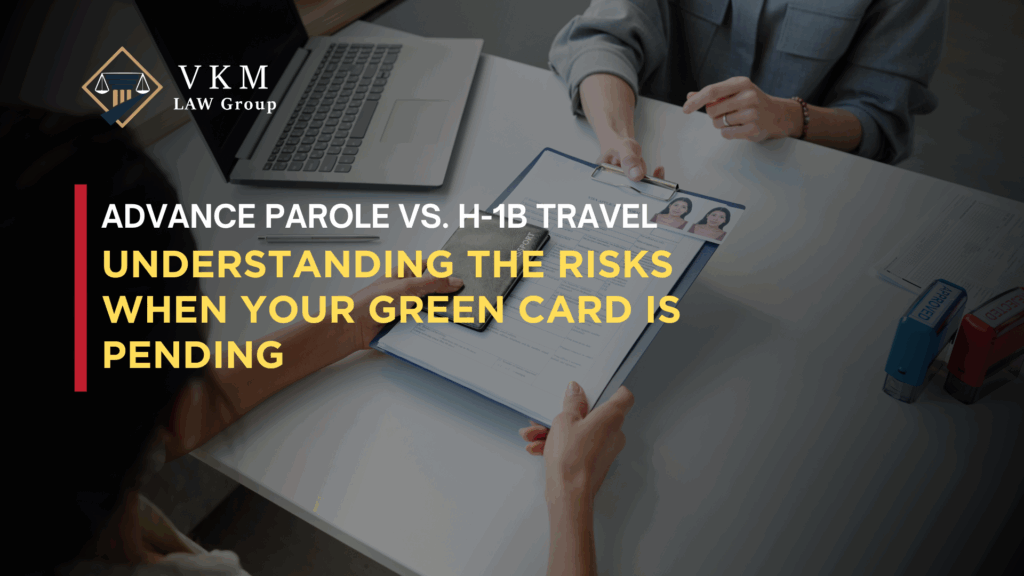
When your green card application is pending, even routine international travel can quickly turn into a legal gray area. At VKM Law Group, we often advise clients navigating this stage of the immigration process to proceed with caution—especially when deciding whether to travel on Advance Parole or maintain H-1B status.
While Advance Parole offers flexibility, it’s not without risk. In many cases, continuing on H-1B status can offer stronger legal protection and predictability. In this post, we’ll walk you through the key differences, risks, and best practices to help you make an informed decision.
What Is Advance Parole?
Advance Parole is a travel document issued by U.S. Citizenship and Immigration Services (USCIS) that allows certain individuals with pending immigration applications—particularly those with a pending Form I-485 (Adjustment of Status)—to leave and re-enter the United States without abandoning their application.
However, it’s important to understand:
🔒 Advance Parole allows re-entry, but it does not grant lawful status.
Moreover, U.S. Customs and Border Protection (CBP) always retains discretion at the port of entry, meaning your re-entry is never guaranteed—even with valid travel documents.
Risks of Traveling on Advance Parole
1. No Lawful Status Protection
While Advance Parole keeps your adjustment application active, it does not confer lawful nonimmigrant status. If your I-485 application is denied, and you don’t hold another valid visa status (such as H-1B or L-1), you could find yourself out of status with limited options.
2. CBP Discretion at the Border
Even with Advance Parole, CBP officers can deny your entry. In rare—but real—cases, applicants have been placed in removal proceedings if officers found that the traveler had failed to maintain their nonimmigrant status.
3. Preconceived Intent Concerns
If you originally entered the U.S. on a temporary visa (like a B-2 visitor or F-1 student visa) and then applied for a green card, CBP may question whether you misrepresented your intentions at the time of entry. This can lead to denial of re-entry or increased scrutiny on future immigration benefits.
Why H-1B Status Offers More Stability
As experienced immigration attorneys in New Jersey, we consistently advise eligible clients to maintain H-1B status during their green card process whenever possible. Here’s why:
- Legal Status Continuity: H-1B provides clear, recognized nonimmigrant status, protecting you if your I-485 is delayed or denied.
- Travel Predictability: Re-entering the U.S. with a valid H-1B visa is generally straightforward and less subject to discretionary denials.
- Work Authorization Is Independent: H-1B status allows continued employment authorization, separate from the pending green card.
- Dual Intent Advantage: H-1B is a “dual intent” visa, meaning you can apply for a green card without jeopardizing your current status.
✍️ Even if your previous H-1B expired, you may be eligible to apply for a new petition or pursue consular processing.
Practical Tips from VKM Law Group
Before you book your flight, consider these essential steps:
- Consult with an immigration attorney before any international travel during the green card process.
- Travel only if necessary when using Advance Parole—and only if your case is solid and up-to-date.
- Maintain valid H-1B status wherever possible, especially if you anticipate any delays or complications in your I-485 process.
- Check visa stamping and re-entry requirements for H-1B travel well in advance.
Final Thoughts
Advance Parole has offered thousands of applicants the ability to travel during their green card process—but it is not without risk. At VKM Law Group, we help clients avoid costly missteps by crafting smart immigration strategies that minimize uncertainty.
If you’re considering international travel while your green card is pending, don’t guess—get legal advice tailored to your case.
Schedule a Consultation
VKM Law Group proudly represents clients in New Jersey and nationwide in all aspects of immigration law, including green card processing, H-1B petitions, Advance Parole, and Adjustment of Status.
👉 Book a consultation today to ensure your travel plans won’t jeopardize your immigration future.